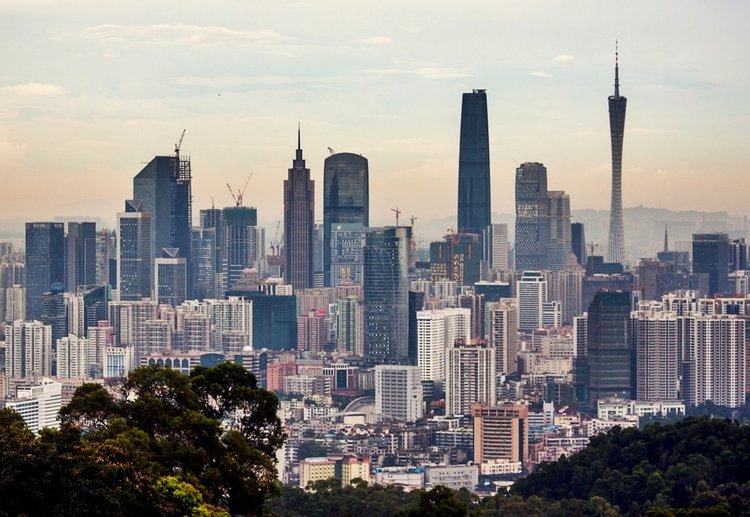Reading globalization in Guangzhou: A Feminist Approach
By Dominica Whitesell
Introduction

Known colloquially as “Little Africa” or “Chocolate City” (Luedi 2018), in the past 30 years the city of Guangzhou, China has become a crucial trading hub for African entrepreneurs. Reflecting on increasing economic and geopolitical ties between China and the African continent, it is estimated that between 20,000 to 130,000 African traders reside and conduct business in Guangzhou (Lee 2014). Very broadly, these trading activities include coordinating with Chinese manufacturers to develop products that fit distinct African consumers’ needs, organizing the mass export of wholesale goods, overseeing the shipping of this cargo across the continent, selling goods to other traders in shops around the city, and negotiating legal and social conditions with city officials. As such, the trading happening in Guangzhou is composed of both large scale and individual enterprises. In the past ten years China has been more forcefully cracking down on Africans trading and living in the area. These new regulations are shaped by racist narratives that position traders as criminals who strain urban resources and whose presence is antithetical to China’s modern image. Rejecting these narratives, in this case study, I deploy feminist and constructivist urban planning frameworks to examine how African traders in Guangzhou intimately embody and drive geopolitical and geoeconomic shifts.
Analysis
In writing about the significance of African traders’ in Guangzhou, Lee notes that “African traders do make a contribution to the economic development of China by paying taxes, employing local Chinese, and through the transformation of the areas they work and live in” (2014, p.54). Indeed, the Chinese economy has dramatically profited from export-oriented manufacturing and increased trade with countries across the African continent (Lyons et. al 2008). Although African traders and their labor remain an under-credited and yet crucial element of this success, a feminist perspective reveals how African traders intimately shape and facilitate this lucrative international trade. Feminist interventions in scale, such as those developed by Adeniyi-Ogunyankin (2019), Kinyanjui (2014), and Khan-Perry (2009), have pushed scholars to think through the intimate, the everyday, and the mundane, and thus grounded geopolitical and geoeconomic shifts in embodied experiences.

These feminist frameworks help us think through not only the political and economic implications of Guangzhou but also how markets are material “transnational urban spaces” (Lee 2014, p. 24) where individual traders gradually transform the city and create alternative urban futures. Although African traders in Guangzhou predominantly come from West and Central Africa, representatives from around the continent can be found around the city (ibid). With these traders come a variety of cultures, food, music, and styles transforming the Guangzhou landscape. In one such building called Tian Xiu, African traders buy and sell a variety of products including textiles and electronics (Figure 1). African cuisines and the latest hit songs from Lagos, Accra, and Kinshasa draw in Chinese, African, and European crowds (Figure 2, Dong 2014, Lyons et al. 2008).
Despite the lucrative and vibrant impact of African communities in Guangzhou, state officials increasingly voice concerns over the legality of traders, rates of crime, and the overall degradation of urban space (Castillo 2016, Luedi 2018, Lyons et. al 2008). These narratives reflect broader racist attitudes that have positioned the presence of African traders as deviant and antithetical to China’s urban modernity. A key moment that marked a dramatic turn towards increased policing, surveillance and deportation of African communities was the Beijing Olympics in 2008. In an effort to ‘clean up’ the city, officials cut the number of visas issued to Africans and instituted more aggressive policies and biometric technologies. As critical urban scholars (Khan-Perry 2009, Roy 2006) have revealed, constructions of urban modernity are always bound up with racialized power. Though much of the once vibrant African community has declined, we can read in traders’ refusal to vacate Guangzhou an active contestation of this projected urban imaginary.
Implications

As relations between China and the African continent continue to be a key issue of international concern (Fowler 2019), it is important to understand how these geopolitical and geoeconomic ties are forged and negotiated in the everyday through conversations, meals, and informal deals. A feminist framework positions young African entrepreneurs and their labor as active agents in the global economy who are “re-drawing trading routes” (Lee 2014, p. 23) and doing the work of “globalization from below” (Tu Huynh 2016). This perspective challenges hegemonic narratives that position Global South subjects as passive victims of global flows, instead of allowing us to see the urban transformations stemming from African traders’ business and place-making strategies. Evident in the variety of cuisines and cafes in buildings like Tian Xiu, in the African prints being sold in marketplaces, and in the Nigerian and Ghanaian songs played at late night clubs around the city, African traders are remaking Guangzhou’s urban landscape. Following Miraftab (2009) I situate the work and lives of African traders in Guangzhou as forms of imaginative “insurgent planning” as they are “promoting the concept of a different world” (p. 33). However, by revealing how marginalized individuals are involved in the construction of the urban, a feminist perspective contributes to insurgent planning by conceptualizing planning as an embodied and evolving process. This further responds to calls from planners to think outside of hegemonic binaries and see cities as a site “in constant formation, drawing on disparate connections, and subject to the play of national and global forces” (Ong 2011, p. 3). Despite increasing regulations by China to curb African settlement, African traders in Guangzhou challenge colonial visions of modernity and development through their everyday embodied practices.
